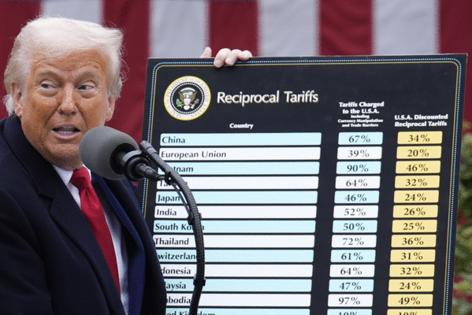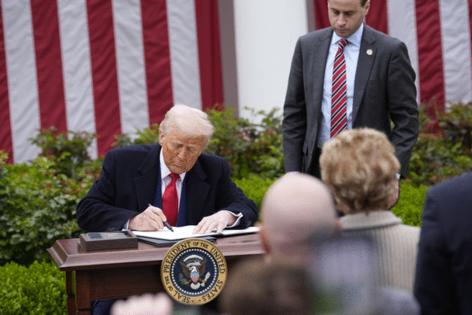Trump orders tariffs starting at 10% on key US trade partners
Published in News & Features
WASHINGTON — President Donald Trump on Wednesday signed an executive order for 10% baseline tariffs on imported goods starting Saturday and additional levies on worst-offender countries, but vehicles and their parts will be excluded.
The baseline tariff will go into effect starting 12:01 a.m. Saturday, and the additional duties will begin at 12:01 a.m. April 9. Trump said those would include levies of 34% on China, 20% on the European Union, 46% on Vietnam, 32% on Taiwan, and 24% on Japan, among others. According to the president, the levies are far below the tariffs those countries charge on U.S. imports.
They’re in response to countries’ “colossal trade barriers,” the president said, not just from levies, but non-tariff barriers from currency manipulation to intellectual property theft that have resulted in unfair trade results.
“Our country and its taxpayers have been ripped off for more than 50 years,” Trump said during an address in the White House’s Rose Garden. “But it is not going to happen anymore.”
Trump had dubbed Wednesday “Liberation Day." The policy could kick off a restructuring of the domestic economy that Trump insists will create a surge of well-paying manufacturing jobs and address America exporting more than it imports. Economists, however, have warned that the measures could quickly plunge the United States into a painful recession — with Michigan among the most vulnerable states.
Trump characterized the tariffs as “reciprocal,” meaning they will be imposed on imports from countries with trade barriers on U.S. exports that the White House believes disadvantages U.S. producers. He, however, has emphasized they won’t be so aggressive as they could be.
“Reciprocal: That means they do it to us and we do it to them,” Trump said. “Very simple. Can't get any simpler than that.” He added: "I call this 'kind' reciprocal. This is not full reciprocal."
Specific goods that will have their own tariff regimes — like autos, aluminum and steel — are exempt from the new reciprocal tariffs. Semiconductors, pharmaceuticals and critical minerals could be added to that list in the future.
The newly announced tariff won’t be stacked on top of the 25% duties on Mexico and Canada that went into effect in early March. Additionally, the exemption for goods (including finished vehicles and parts) compliant with the United States-Mexico-Canada trade agreement that Trump signed in 2020 will remain exempt from those tariffs. Trump previously had suggested that was merely a one-month delay.
Uncertainty around details of the reciprocal tariffs have roiled stock markets for weeks, though major market indexes and shares of the Detroit Three automakers closed up Wednesday ahead of the announcement. After the Rose Garden announcement, futures prices for Detroit's automakers and key indices pointed downwards.
Tariffs are a tax on goods arriving in the United States and other countries. Businesses, not the governments of countries facing a specific tariff, pay the charge upon import.
The Trump administration, however, has said that billions in revenue from the tariffs would be used to fatten government coffers ahead of a major tax cut expected to be extended later this year by the Republican-controlled Congress.
He’s also accused other nations of cheating, not just through levies, but nonmonetary means. Examples include currency manipulation, tax distortions, dumping and export subsidies, punitive technical barriers, agricultural constraints, sweatshop labor, pollution, counterfeiting and intellectual property theft.
Companies typically offset the cost of tariffs by raising prices somewhere in their supply chain, renegotiating lower prices with business partners or passing their costs to consumers through higher prices. The tax itself, however, won't show up directly on their receipts at grocery stores and other retailers.
University of Michigan economist Justin Wolfers predicted ahead of the announcement in a social media post that the new tariffs would be “the biggest tax hike in decades and the most regressive in living memory,” meaning that the burden will fall disproportionately on lower-income Americans.
Wolfers is a nonresident fellow at the Petersen Institute for International Economics, a nonpartisan think tank that has predicted price hikes and economic slowdowns resulting from trade wars with top U.S. trading partners.
Trump invoked the International Emergency Economic Powers Act of 1977 for the reciprocal tariffs. He also used it to justify 25% tariffs on Canada and Mexico that went into effect in March and 10% tariffs on China in February and then again in March.
That justification carries risks. Congress can vote to end presidential emergency declarations used to assess tariffs.
U.S. Sen. Tim Kaine, D-Virginia, is already leading such an effort to end the emergency declaration enabling the Canada tariffs. His resolution for doing so, which has some partisan support, is set for a vote Wednesday, according to the Associated Press. If successful, it would still need to pass the Republican-led House.
Reciprocal tariffs could stretch across industries from manufacturers of appliances, chemicals and furniture, as well as farming.
Michigan exports more than $2.7 billion of agricultural products each year. The Michigan Farm Bureau earlier this year emphasized its support for "free and fair trade" and expressed concerns about potential retaliation from other countries against U.S. agricultural exports in response to levies on Canada and Mexico.
Monroe-based furniture maker La-Z-Boy Inc. on Wednesday declined to comment ahead of the tariff announcement. The Detroit News also reached out to Benton Harbor appliance manufacturer Whirlpool Corp., Battle Creek cereal maker WK Kellogg Co., Midland chemical maker Dow Inc. and Grand Rapids office furniture company Steelcase Inc.
Trump has pledged to spark a renaissance for American manufacturing jobs, and his Rose Garden audience fit that profile. Alongside Trump allies and administration officials clad in suits and other business attire, dozens in attendance are wearing blue-collar uniforms — hard hats, jeans, and neon construction vests. Trump at one point threw a “Make American Great Again” hat to a group of autoworkers in the crowd.
The European Union, Canada and China have all vowed in recent weeks to retaliate against Trump's tariffs with their own levies on U.S. goods. EU officials say that as soon as mid-April they will target as much as $28 billion worth of American goods with tariffs of up to 50%. The tariffs could affect key U.S. exports like whiskey and motorcycles.
Canada has imposed tariffs on billions of dollars of U.S. goods already, including U.S. steel and aluminum, appliances, liquor and more, and leaders have threatened more levies to come in response to Trump's Wednesday announcement.
China has also hit back on escalating tariffs that recently rose to 20%, with its own taxes at rates of up to 15% on imports such as U.S. coal, crude oil, farming machinery, wheat and corn.
Mexico has taken a softer approach thus far, with President Claudia Sheinbaum on Wednesday stating her country would not go tit-for-tat with the United States on tariffs, but would rather wait to see the details and "announce a comprehensive program," according to a Reuters report.
At 12:01 a.m. on Thursday, 25% tariffs on imported vehicles and major automotive parts from engines and transmissions to electrical components are set to take effect, with Trump citing national security concerns for those. Analysts have predicted much of those costs will be passed onto consumers through increased prices. Automotive profit margins are mostly single-digit percentages.
Certain auto parts that are compliant with the USMCA will remain tariff-free until the government installs processes to exempt only the value of the U.S. content.
New estimates from the East Lansing-based consulting firm Anderson Economic Group LLC expect tariffs will add $2,500 to $5,000 for the lowest-cost American cars, and up to $20,000 for some imported models. AEG estimates a U.S. consumer impact of $30 billion in the first year.
Some customers already have become weary. In the fall, Tim Kramer, 57, of Waterford Township traded in his Ram truck for a newer Chevrolet Colorado when he was hearing about Trump talking about tariffs.
“I knew it would nickel and dime me too much,” Kramer said about if he waited. “Everybody voted of him because they wanted the prices to come down. That is not happening. Tariffs are just going to destroy the American people’s dollar. I am not spending as much and hoarding my money. I know what’s coming.”
Trump also has found strange bedfellows with the United Auto Workers, which mostly has cheered on the reexamination of free trade agreements that it blames for sending jobs to low-wage countries like Mexico. It argues that with billions of dollars going to dividends, corporate buybacks and executive compensation, automakers can afford the tariffs. Trump on the campaign trail said union President Shawn Fain "should be fired," while the UAW president called Trump a "scab."
Trump in early March imposed 25% tariffs on Canada and Mexico over immigration and the fentanyl drug trade, though reduced levies or delays on particular goods and industries have followed, including the USMCA exemptions.
Trump last month also imposed 25% duties on imported aluminum and steel. On China, he's instituted a combined 20% tariff as well.
The last time there was a tariff-related event in the Rose Garden — which Trump reportedly wants to pave over and convert to a different style of event space — was some 11 months ago. Then-President Joe Biden made Michigan a central focus of his announcement of 100% tariffs on Chinese electric vehicles and related products.
"It's our declaration of economic independence," Trump said about the new reciprocal tariffs. "Jobs and factories will come roaring back into our country."
_____
©2025 The Detroit News. Visit detroitnews.com. Distributed by Tribune Content Agency, LLC.










Comments